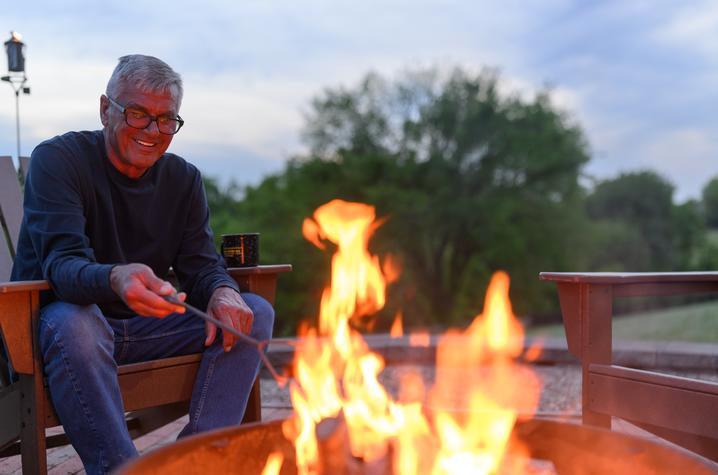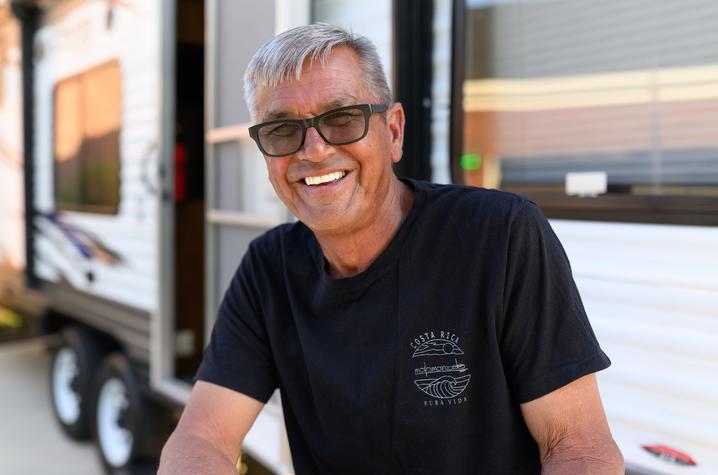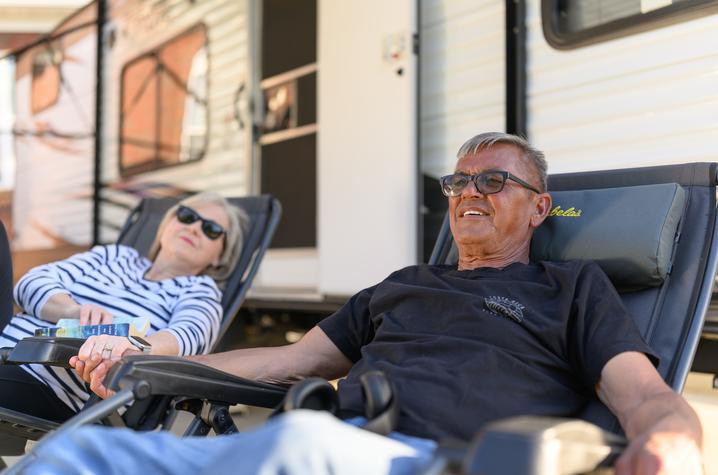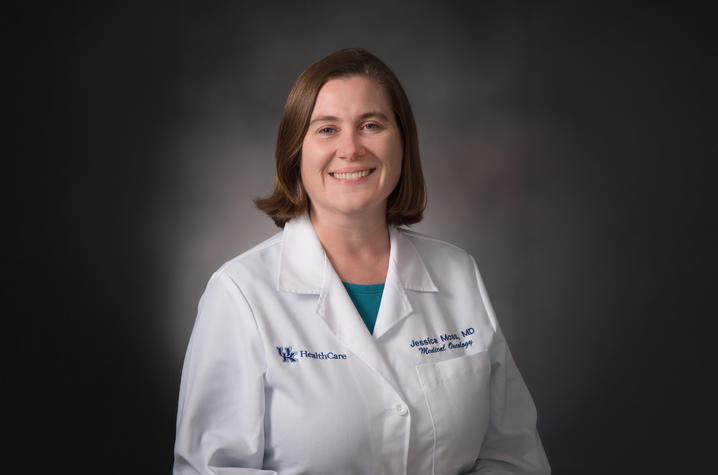Precision medicine allows Markey patient to reclaim life
LEXINGTON, Ky. (June 9, 2025) — Gary Larkin remembers the exact moment he first knew something was wrong. It was the summer of 2023, during his brother’s 60th birthday party near Elkhorn Creek. The normally energetic construction business owner suddenly found himself overwhelmed by heat and chills and left the celebration to seek relief by jumping into the creek’s cool water.
The episode led to a series of emergency room visits that provided no real answers. But as Gary’s symptoms — chest pain, shortness of breath and fatigue — worsened, his primary care doctor didn’t give up. And in November 2023, he got a scan that would reveal a tumor on his pancreas.
At his first meeting with his oncologist Jessica Moss, M.D., at the University of Kentucky Markey Cancer Center, Gary learned he had stage 4 pancreatic cancer that had spread to the liver and the lining of his stomach — a devastating diagnosis with a average survival rate of around a year.
“One of the reasons pancreatic cancer is so severe is that it usually shows little or no symptoms until it has spread,” said Moss. “Because of that, most cases — like Gary’s — are diagnosed at later, more difficult to treat stages.”
Gary’s initial treatment consisted of chemotherapy infusions called folfirinox. The powerful combination of drugs can cause harsh side effects, including fatigue and nausea. After six months of infusions, Gary’s weight plummeted from 210 to 150 pounds. He also began experiencing neuropathy in his hands and feet.
For Gary and his wife, Jennifer, life came to a halt. He could no longer fully operate his construction business, and the couple who are passionate outdoor enthusiasts had to abandon the camping and boat trips that filled their calendar throughout the year.
“By the time I started feeling better from one round of chemo, it was time for the next. I was just sick all the time. I wasn’t living, just existing,” said Gary.
“Now it’s completely different.”
New treatment transforms daily living
Despite its tough side effects, the chemotherapy was initially effective. But when Gary’s cancer began growing again in September 2024, genetic testing revealed another treatment option.
Earlier tests showed his tumor had a specific genetic mutation called KRAS G12C, and a drug called adagrasib (Krazati) had been recently approved by the FDA to treat lung and colorectal cancers with this exact mutation.
The UK Markey Cancer Center’s Molecular Tumor Board reviewed Gary’s case and recommended he take adagrasib “off-label” for pancreatic cancer. Instead of continuing with infusion chemotherapy, Gary began taking this targeted therapy as a simple daily pill.
His transformation since starting the new treatment has been remarkable: With fewer side effects, he’s regained much of the weight he lost and is now back to managing his construction business part-time.
“I can keep the business going now,” Gary said. “I thought I’d have to close the shop, but since I’ve been on this new treatment I can manage it.”
The marker for pancreatic cancer in his blood, called CA 19-9, had also plummeted from 24,000 to 7, and is now considered in the normal range.
Precision medicines like adagrasib, which are treatments tailored to the genetic profiles of each patient, can improve the quality of life for patients like Gary. They also hold promise for the next, more effective, treatments for difficult and aggressive cancers like pancreatic cancer, says Moss.
“We essentially have three chemotherapy regimens that work for stage 4 pancreatic cancer patients, and none of them work particularly well,” Moss said. “But with today’s growing understanding of the genomic and molecular basis of cancer and how certain mutations make you sensitive to some of these newer drugs, we can really target our therapy better — leading to better patient outcomes.”
A collaborative approach to complex care
Throughout his treatment journey, Gary has faced additional health challenges, which have required a coordinated effort from multiple specialists.
Due to changes in blood consistency, patients with pancreatic cancer commonly experience blood clots and strokes. When Gary suffered an acute stroke, he received care from UK HealthCare neurologist Shivani Pahwa, M.D., who coordinated with vascular specialists for a carotid stent placement. The stroke caused temporary blindness in one eye, but the intervention has prevented further complications.
Gary’s care team also includes Amid Arbune, M.D., a cardiologist with UK HealthCare’s Gill Heart & Vascular Institute, who has monitored his heart throughout treatment, and pulmonologist Subhendu Rath, M.D., who has adjusted his lung medications to improve his breathing.
“What really stands out about Gary’s treatment is how the entire care team works together — from all of the doctors to the pharmacy team and nutritionists,” Jennifer said. “Every symptom has been taken seriously. Nothing has ever been dismissed as ‘just a side effect.’”
Jennifer also appreciates how the care team recognized her role as both caregiver and spouse.
“They’ve always checked to make sure I was okay too,” she said. “They understand that cancer affects the whole family, not just the patient.”
Living life to the fullest
Gary’s latest CT scans show his liver metastases had improved and other areas are remaining stable. Moss plans to continue the targeted therapy as long as it works, with scans and labs about every three months.
For Gary and Jennifer, one of the most important aspects of his care has been Moss’s emphasis on living life fully despite the diagnosis. This is something that, thanks to the addition of the new medication, he has been able to put into practice.
Taking their RV and boat to the lake was one of their favorite activities that they had to put on hold. But today, the couple has already planned four camping trips for the upcoming summer. They are also expanding their horizons beyond local trips — recently traveling to Costa Rica.
“When they asked me if they could travel abroad, I told them to go for it,” Moss recalled. “I said, ‘You’re on this pill, so you can take it with you. Go and have a good time.’ And then they told me ‘Well, that’s good, because we already bought the tickets.’”
This moment captured their renewed perspective on the approach to each day.
“We’re just not sitting around waiting anymore,” said Gary. “Dr. Moss has always told us, ‘You need to live. Go live your life.’ And that's exactly what we’re doing.”
UK HealthCare is the hospitals and clinics of the University of Kentucky. But it is so much more. It is more than 10,000 dedicated health care professionals committed to providing advanced subspecialty care for the most critically injured and ill patients from the Commonwealth and beyond. It also is the home of the state’s only National Cancer Institute (NCI)-designated Comprehensive Cancer Center, a Level IV Neonatal Intensive Care Unit that cares for the tiniest and sickest newborns and the region’s only Level 1 trauma center.
As an academic research institution, we are continuously pursuing the next generation of cures, treatments, protocols and policies. Our discoveries have the potential to change what’s medically possible within our lifetimes. Our educators and thought leaders are transforming the health care landscape as our six health professions colleges teach the next generation of doctors, nurses, pharmacists and other health care professionals, spreading the highest standards of care. UK HealthCare is the power of advanced medicine committed to creating a healthier Kentucky, now and for generations to come.









